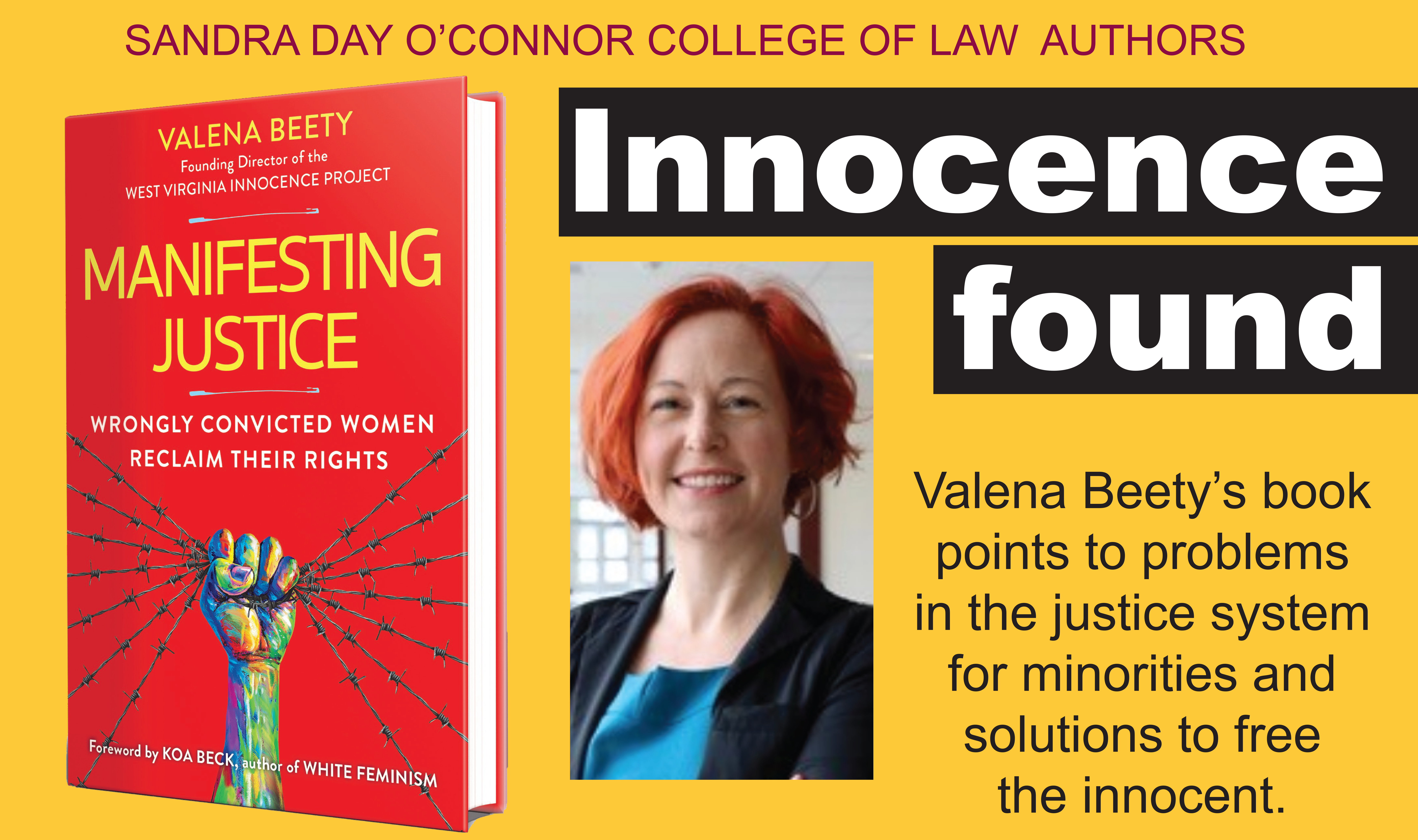The Law Library is excited to launch an ongoing series in which we will be reviewing newly published books authored by faculty of the Sandra Day O’Connor College of Law. This is the first review in the series.
As a prosecutor, Valena Beety, author and law professor, had been a carceral feminist, seeking to promote justice for women by incarcerating those who harmed them. But she realized that her passion for promoting justice needed to involve confronting criminal injustices, and freeing the falsely convicted.
Her new book, Manifesting Justice, illustrates the dangers the legal system presents to innocent people, particularly women and members of minority groups who face intersectional disadvantages. The book also presents flaws in safeguard legal doctrines such as habeas corpus and postconviction procedure that can keep the innocent behind bars. Beety writes about the problems faced by women, Black and Brown people, people with disabilities, and LGBTQ+ people, such as the two defendants in her central story.
The tale of the alleged sexual assault injury of Kimberly Williams that forms the heart of this book is gruesome. Lesbian woman Leigh Stubbs and Tami Vance stood trial in rural Mississippi for a sexually charged and heinous assault during a road trip.
After a night at a motel, Kim exhibited signs of an overdose, prompting her friends to call 911. At the hospital, nurses and doctors noted signs of rough sex. Authorities developed a theory that Leigh and Tami had jammed Kim into a toolbox, assaulted her, and bitten her. It all went downhill from there for Leigh and Tami, with a zealous dentist eagerly providing faulty bitemark evidence against the two women.
This injustice is only one of many that author and former prosecutor Beety cites in her book, as many innocent people across the country suffer through incarceration and the lingering hardships of a criminal record despite being innocent. Beety identifies the following sources of injustice and proposes solutions to create a system less concerned with finality and punishment and one more concerned with equity:
Manifest Injustice/Finality: Manifest injustice, a doctrine enabling judges to overturn decisions if verdicts or sentences are flawed, recognizes that convictions tied to racism, police and prosecutor misconduct, oversentencing, and false evidence are wrongful. This doctrine enables holistic review of all circumstances leading to a conviction to determine whether it unjust. It is rarely used because courts often prize finality, or a sense that concluded cases should remain undisturbed. Beety advocates that courts should use a manifest injustice “confluence of errors” standard, and examine not just evidence used at trial. Furthermore, federal courts should be empowered to review state court decisions de novo. Reviews should expand what evidence is examined to reduce the threat of exculpatory evidence being suppressed by prosecutors, as well as the threat of defense counsel failing to protect clients’ interests. Errors should be examined holistically rather than individually because fairness and justice are more important than speed and finality, and individual review frequently leads to unjust findings of “harmless error.” The high standard of “actual innocence” on review for wrongful convictions should be reduced to the more manageable standard of manifest injustice.
Gender: Women deserve equal dignity and protection from sexual assaults, including strip searches in prisons. The law should provide sex workers and people forced into sex work with safe pathways out of that lifestyle free of the fear of prosecution. The law should recognize that innocent women may not be involved in the wrongdoing of another, such as a boyfriend or a husband, although presently many innocent women suffer because of mere association.
LGBTQ+: The law must provide more evenhanded treatment of defendants that does not rely on stereotypes or myths about homosexual behavior. Although most LGBTQ+ people have seen an end to their “criminalization,” or treatment as inherently deviant or potentially arrest-worthy, the criminalization of transgender people remains and must stop.
Race: Racism should be reviewed for in a confluence of factors review, a holistic look at the trial and factors that could potentially disrupt justice and lead to wrong results. Defendants should be empowered to challenge legal actions based on racially disparate impact, or actions that disproportionately affect people of color.
Ableism: Defendants of color with disabilities face particular burdens. When a suspect cannot raise his hands or hear commands, they may face dire consequences. Police should be trained to better prepare them for interactions with differently abled people.
Forensic Evidence: Defendants do not have access to forensic science lab results and often lack adequate means to challenge findings, so they should be given equal access to scientific findings. Scientific evidence now widely acknowledged to be faulty, such as bite marks or burn patterns, should be subject to intense review in current and past cases.
War on Drugs: The law should treat drug use as a medical issue rather than the kind of criminal issue that levies harsh sentences for first time offenders, or even the wrongly accused. Pregnant women are especially susceptible to harsh treatment, facing charges beyond mere possession such as child endangerment or even furnishing drugs to minors. Sentences should be reconsidered, and alternatives such as drug treatment plans may be appropriate substitutes. Prosecutors should support rehabilitation and community based solutions rather than prison time. Laws that expose people to criminal charges discourage bystanders from helping those in danger from an overdose and actually lead to more deaths.
Corrective Justice: People accused of harming the victim would make up for their actions instead of, or as well as, spending time in prison. This alternative would restore fairness to the victim and the community.
Expungement: Expungement, or the clearing of convictions from a person’s criminal record, should be increased to stop tying people to old convictions, which can lead to problems securing essentials such as housing and employment. People should not be subject to pleas that permanently imprint their criminal records in order to secure their freedom.
Prosecution Reform: Prosecutors, including the author when she was in a previous role, often become enamored of their own roles as crusaders for good. The criminal legal system should recognize these potential biases of prosecutors, and encourage them to truly pursue justice rather than pursuing and defending convictions that may be injustices.
After its release in May, Manifesting Justice will be on the shelves at the Ross Blakely Law Library along with author Valena Beety’s previous book, The Wrongful Convictions Reader




